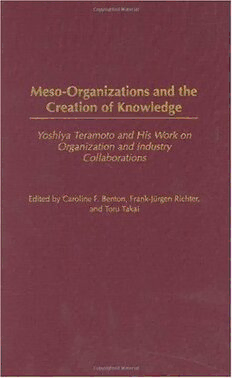
Meso-Organizations and the Creation of Knowledge: Yoshiya Teramoto and His Work on Organization and Industry Collaborations PDF
336 Pages·2004·21.299 MB·English
Most books are stored in the elastic cloud where traffic is expensive. For this reason, we have a limit on daily download.
Preview Meso-Organizations and the Creation of Knowledge: Yoshiya Teramoto and His Work on Organization and Industry Collaborations
Description:
Competitive advantage in today's complex and global marketplace is no longer created by the internal resources of a single organization or organizational group. Businesses must reach beyond the traditional boundaries of their organization, industry and market to form diverse networks that can create truly unique value.Japan is now in its longest recession of the post-World War II period. This failure stems from macroeconomic malfunctioning and—more important—from the country's cultural environment, which has been inhibiting domestic corporations' abilities to respond to dire socio-economic issues. As all traditional attempts to revitalize the economy have failed, creative ideas and purposeful interventions are necessary for survival. Past business assumptions must be discarded, the most important of which is the emphasis on insular business practices that focus on the internal environment of a single organization or corporate group. Unique value can no longer by created in a static and limited manner.To create unique value in the increasingly sophisticated, advanced and fragmented environment of the global marketplace, corporations are forming partnerships that cross all societal boundaries. The authors coin the term meso-organizations for such networks that go beyond the scope of traditional businesses and bring in individuals, organizations from different industries and not-for-profit organizations into their business processes, and that view their environments as extensions of themselves. This book pulls together and expands on various theories of networks and knowledge creation to present a framework that captures the complex nature of today's business domain and processes, and offers suggestions for wide-ranging collaboration.
See more
The list of books you might like
Most books are stored in the elastic cloud where traffic is expensive. For this reason, we have a limit on daily download.
